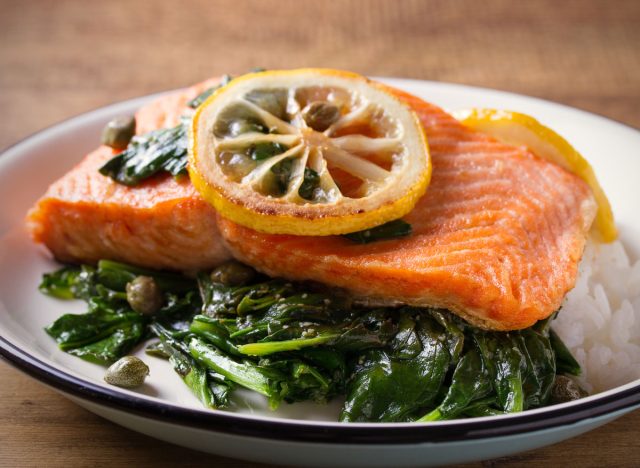4 Effective Eating Habits of People Who Lost 10 Pounds in One Month

If you're wondering how to lose 10 pounds in a month, you need to take a hard look at your diet and make some necessary adjustments. It's always motivating to hear success stories from individuals who have already traveled down a similar road to weight loss as you're about to embark on. That's why we took to TikTok to learn all about what people who lost 10 pounds in a month reveal about their best eating habits. What works for some may not work best for others, but these stories, tips, and tricks can serve as endless inspiration as you get going on your own personal journey to losing weight.
Eat This, Not That! spoke with Lisa Young, Ph.D., RDN, the author of Finally Full, Finally Slim, a nutritionist in private practice, and a member of our Medical Expert Board, who shares her expert insight on the eating habits these individuals followed in order to lose 10 pounds in a month. As with any successful weight loss regimen, getting in regular exercise, managing your stress levels, and getting sufficient restful Z's every night are all key players in the game.
Keep reading to learn how to lose 10 pounds in a month from individuals who have already been there and done that. And when you're finished, don't miss out on 4 People Who've Lost 20 Pounds Share Their No-Fail Tips.
Eat plenty of veggies.
TikToker Maddie Fisher (@madelynmoments) starts off her video by writing, "10 pounds down: what I ate on one month of WW." The first clip is all about veggies—a glass casserole dish filled with sweet potatoes and broccoli.
"Consumption of vegetables creates a sense of fullness while being naturally low in calories," Young explains. "It is rich in fiber which keeps you fuller for longer and helps regulate appetite and prevent overeating. Vegetables are rich in vitamins, minerals, and antioxidants which are beneficial to maintain the body's nutritional needs while on calorie deficit."
Establish a calorie deficit.
TikTok user Nicole (@nicole_ashley_m) captioned her weight loss video, where she shares exactly what she ate in order to lose 10 pounds in a month, "Calorie deficit doesn't have to be boring—I love food."
Establishing a calorie deficit you actually stick with can help you lose weight because your body will begin to utilize the energy that's stored as fat for an energy source. "To create a calorie deficit, you need to increase physical activity and make changes to your diet," Young explains. "This can be done by reducing calorie intake and increasing physical activity levels thus creating an energy imbalance leading to weight loss over time. The diet should still consist of a variety of foods to meet the body's nutritional needs."
Choose lean proteins in meals, like fish.

In TikToker Nicole's video, she shows a lot of meals with lean protein, like fish. Opting for lean proteins when you're looking to lose weight is a smart idea, as they have a pretty low calorie count when compared to other protein sources that are high in fat. "Lean protein helps increase satiety and reduce cravings thus encouraging portion control and preventing snacking in between meals," Young explains. "Consumption of lean protein preserves muscle mass even during weight loss as it prevents muscle breakdown."
Cut carbs.
The Natasha Brand, a brand that sells all-natural supplements, posted a TikTok of someone with PCOS who dropped 10 pounds in a month. The brand revealed they cut out carbs from their diet, performed weight training, and took PCOS supplements.
Real talk: Freshly baked muffins and croissants are downright delicious, but they aren't doing your weight loss efforts any favors. Cutting back on carbs is the name of the game if you want to melt stubborn body weight. According to Young, "Less consumption of carbohydrates helps with weight loss as it is a source of energy, and when it's not present, the body resorts to use stored fat leading to fat loss. Reducing [your] intake of carbohydrates also increases satiety as it prevents hunger and cravings. Carbohydrates are digested quickly compared to protein and fats, thus consumption can cause feelings of hunger leading to overeating and weight gain."









